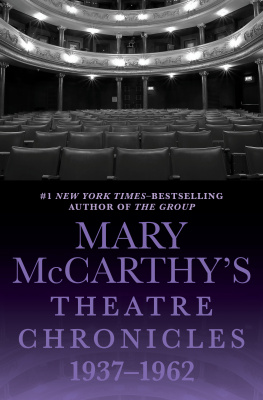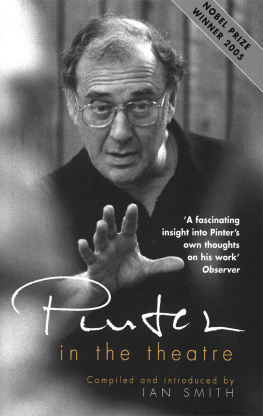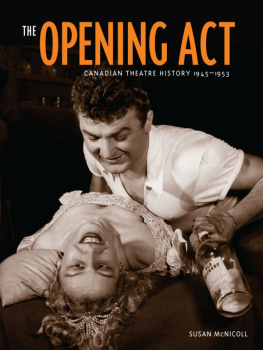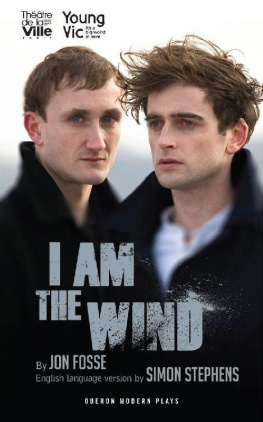The editors wish to thank the following people for their invaluable assistance in compiling this volume: Vivian Barnes John Cerullo Jelani Cornick Allison Epperson Robert Barry Fleming Elizabeth Greenfield Mary Kate Grimes Carrie Hagovsky Melissa Hines Laura Humble Jane B. Jones Steve Knight Meredith McDonough Meghan McLeroy Zachary Meicher-Buzzi Erin Meiman Kevin E. Moore Hannah Rae Montgomery Jessica Reese Jeffrey S. Rodgers Joan Sergay Charlotte Stephens Michael Tan Emily Tarquin Les Waters Paul Werner Beth Blickers Emma Feiwel Michael Finkle Leah Hamos Olivier Sultan Rachel Viola Alexis Williams Derek Zasky
Copyright 2018 by Mara Nelson-Greenberg. All rights reserved. CAUTION: Professionals and amateurs are hereby warned that
is subject to a royalty.
It is fully protected under the copyright laws of the United States of America and of all countries covered by the International Copyright Union (including the Dominion of Canada and the rest of the British Commonwealth), the Berne Convention, the Pan-American Copyright Convention, and the Universal Copyright Convention, as well as all countries with which the United States has reciprocal copyright relations. All rights, including professional, amateur stage rights, motion picture, recitation, lecturing, public reading, radio broadcasting, television, video or sound recording, all other forms of mechanical or electronic reproduction, such as CD-ROM, CD-I, information storage and retrieval systems and photocopying, and the rights of translation into foreign languages, are strictly reserved. Particular emphasis is laid upon the matter of readings, permission for which must be secured from the Authors agent in writing. Required royalties must be paid every time this play is performed before any audience, whether or not it is presented for profit and whether or not admission is charged. All inquiries concerning rights, including amateur rights, should be addressed to: United Talent Agency, 888 Seventh Avenue, 9th Floor, New York, NY 10106. ATTN: Rachel Viola, .
ABOUT DO YOU FEEL ANGER?
This article first ran in the Limelight Guide to the 42nd Humana Festival of New American Plays
, published by Actors Theatre of Louisville, and is based on conversations with the playwright before rehearsals for the Humana Festival production began. Sofia truly believes that everyone is capable of exercising deep, radical empathy towards one another, if theyre just given the chance to learn how.
But when she starts her new job as an empathy coach at a debt collection agency, her conviction is stretched to its limit. These employees are spectacularly clueless when it comes to compassionate listening. (In fact, they spend more time swearing at debtors than listening to them during collection calls.) And their tone-deaf phone demeanor is just the tip of the iceberg; things are much worse in the office. Eva, the sole woman on staff, is getting mugged in the kitchen with alarming frequencyand no one but Eva seems to care. Can Sofia really help her clients understand other peoples emotions, if they can barely identify what an emotion is? In her outrageous new comedy Do You Feel Anger?, Mara Nelson-Greenberg draws a portrait of an absurdly toxic workplace environment, where genuine concern for other humans is in short supply. According to the playwright, the impulse for this sharp satire sprang from the emotionally fraught 2016 presidential election, and the tenor of public discourse that followed it.
Everyone was saying, We just have to love one another right now, and Its just about listening right now, she recalls. And though the author shared those sentiments, she recognized how easy it would be to neglect following through on good intentions. I think its easy to say, Im a good listener; Im empathetic, she muses. But the real challenge lies in holding yourself accountable on the micro-level to practice the things you say you want to practice. I think were really good at self-deception. The play was also inspired by the empathy training classes Nelson-Greenbergs mother and sister took as part of their medical studies.
Clinical empathy, once casually dismissed as good bedside manner, is increasingly considered an essential skill. Workshops offering step-by-step techniques designed to improve compassionate listening are part of a growing trendnot only in hospitals, but also in corporations and business schools. Nelson-Greenbergs curiosity was piqued when she researched course outlines online and found a practical how-to approach. Treating feelings like something you need to problem-solve, almost like a math problem, was really fascinating to me, says the playwright. The suggested exercises are simple but effective, she explains, giving an example: Someone stands up and tells a story about something that happened to them, and then someone else has to identify the feelings that person must have experienced when they went through it. Many of these exercises appear in Do You Feel Anger?but Nelson-Greenberg has imagined them unfolding with hilariously awful results.
Howie and Jordan, two employees at the debt collection agency, are astonishingly inept at identifying feelings; when pressed, they just make up words. Sofias attempts to help Howie and Jordan expand their emotional vocabulary are met with seething anger (which happens to be one of the few feelings they can identify). Meanwhile, poor Eva is wound so tightly that shell say just about anything to avoid upsetting her colleagues. As she immerses herself in the agencys workplace culture, Sofia discovers a fundamental challenge to her work: some people in this office have permission to feel anger; others dont. For me, anger is one of the scarier emotions to get fully in touch with, shares Nelson-Greenberg. Anger is a really policed feeling.
And thats interesting to me. The characters in Do You Feel Anger? all have very different relationships to the titular emotion: Eva, for example, seems terrified to even say the word, but Howies volatile temper has been tacitly endorsed by the boss since day one. In Sofias empathy exercises, Howie wields his rage like a weapon when he reaches the limits of his ability to express himself. With surprising sensitivity and nuance in an otherwise outlandish comedy, Do You Feel Anger? illuminates the complicated gender politics that discourage men from exploring a full range of emotional expression. Anger can become a catch-all for other unarticulated feelings, reflects the author. It can be used as a weapon, but it can also be a prison.
I think a lot of peopleand many men in particularare prisoners of their own anger. And of course, anger demands immediate attention. It can suck up all the oxygen in the room, while other issues (such as Evas legitimate concerns about her own safety) simply get ignored. As Sofia leads these emotionally stunted coworkers towards some sort of enlightenment, her progress is painstakingly slow. And ironically, her own emotions are proving just as unwieldy. Shes been wrestling with some complicated feelings ever since she learned about her fathers betrayal of the family.
But when Sofias mother reaches out to her on the phoneagain and again and againSofia prefers to silence the call. Ive been thinking about how these larger social issues play out on a personal level in many families as well, says Nelson-Greenberg. In Do You Feel Anger?, the problem is that some peoples feelings matter more than others. The implications of that dynamic emerge as the play unfolds, revealing a kind of danger thats hilarious until it isnt. And thats precisely how Nelson-Greenberg wants it: My goal is to keep the audience laughing until they realize its too late. Jenni Page-White









